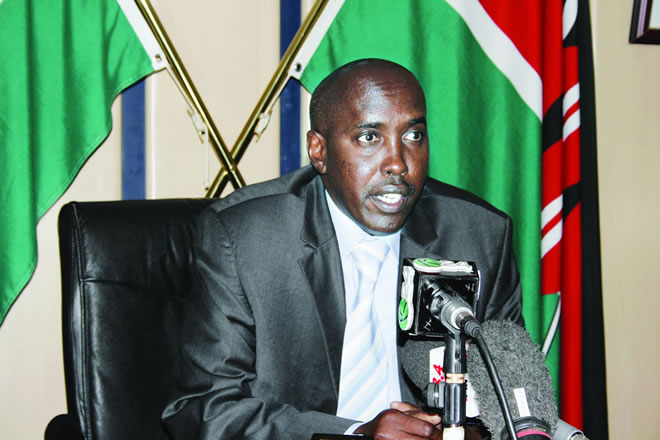
Interior Secretary Joseph Ole Lenku said last year that refugees abused Kenya’s hospitality and use the country as a haven to plan and carry out terrorist attacks.

By Charles Wachira
Friday, February 14, 2014
Kenya’s Interior Ministry promised to crack down on street crime, ethnic violence and the threat of attacks by al-Qaeda-linked militants that led foreign governments to issue travel warnings.
The government set a 100-day deadline from Feb. 10 to implement measures ranging from boosting counter-terrorism practices to cracking down on cattle rustling, according to the “100 Days Rapid Results Initiative on Fighting Crime Wave in Kenya” published by the ministry this week. The report didn’t detail the cost or the sources of financing for the program.
While the total number of criminal cases reported to the police fell 8 percent between January and November 2013, from a year earlier, violent offenses including murder, robbery and rape surged between 11 percent and 22 percent. The proliferation of small arms, income inequality and high unemployment fuel criminality in Kenya, according to the police.
At least 67 people died in September when al-Qaeda-linked militants used guns and grenades to attack a shopping mall in Kenya’s capital, Nairobi, leading governments including the U.S. to warn travelers to exercise caution in the country.
Kenyan security agencies are viewed by the public as “ineffective and corrupt and impunity was a problem,” heightening insecurity in the East African nation, according to a statement on the U.S. State Department’s website. An overhaul of the police services that is under way seeks to curb abuses and establish greater accountability, according to the report.
Security Gaps
Rising insecurity over the past few months may be the result of criminals exploiting security gaps as authorities devote most of their energy and resources to combating “terrorism,” said Mohamed El Kassas, chief executive officer of Integrated Fire & Safety Solutions Ltd., a security company.
El Kassas said he escaped an attempted car-jacking on a busy highway in the capital, Nairobi, last month as he was driving his wife, children and another family to dinner.
“The government is focused on the terrorist attack at Westgate and subsequent threats and less on the widespread security measures, which were already poor in the country to begin with,” El Kassas said in a phone interview today.
Preventing the “radicalization of the public” and increasing intelligence collection and surveillance at entry points and borders are among the anti-crime measures in the ministry’s plan.
Muslim youths rioted this month at the Kenyan port city of Mombasa in and around a mosque the authorities say is a recruitment center for militant groups. At least six people died in clashes with police and about 104 suspects were charged with crimes of terrorism, incitement and robbery.
Militant Profiling
The government will also improve profiling of militant groups and accelerate the repatriation of Somali refugees living at United Nations-run camps, the plan says.
The Dadaab refugee complex in northeastern Kenya, opened to cope with the influx of Somalis fleeing conflict following the ouster of dictator Mohamed Siad Barre in 1991, is stretched beyond capacity with 600,000 mostly Somalis. Interior Secretary Joseph Ole Lenku said last year that refugees abused Kenya’s hospitality and use the country as a haven to plan and carry out terrorist attacks.
The creation of a new layer of government in March has stoked fresh rivalries for power, coupled with competition for land and resources, spurring inter-communal conflicts that killed 491 people, injured another 1,235 and drove 47,050 people from their homes last year, according to the UN.
The Kenyan government is developing a protocol on cattle raiding, expanding training to police to deal with crime and increasing the number of peace monitors and security officers in conflict-prone areas, according to the 100-day program.